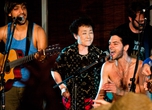Fuji Rock: Twenty One Pilots interview
‘You don’t necessarily need an album to prove yourself’

Posted: Mon Aug 06 2012
Though they recently signed to Warner Music Group subsidiary Fueled By Ramen, Twenty One Pilots secured a slot at this year's Fuji Rock Festival thanks to some impressive live videos documenting gigs in their native Ohio. Time Out sat down with the duo backstage, sweaty but satisfied, after a Red Marquee performance that had included costume changes, back flips and a drum duo to the strains of Rihanna's 'We Found Love'.
Did that go pretty much as you expected?
Tyler Joseph (keyboard, vocals): I would say I had no idea what to expect. Every time we play a show in front of people who don't know who we are, we always wonder if people are going to get it – and then you come to a different country, and that wonder or worry is amplified. If you were to ask me what the best case scenario would've been before the show, I wouldn't even think that that would happen. It went just so well: they were just so into it, and they were so supportive of a band that they're not even very familiar with.
Josh Dun (drums): It's nerve-racking, having different languages and the language barrier. You're like, 'Are they going to understand us, or is that stuff that we say going to translate?' And I think what's cool is, like, energy translates. We're in another country with thousands of other people who don't speak the same language, but we're all going nuts at the same time.
Tyler: For the first time, I really understood the power of music. Just because it transcends where we are in the world, and that's really cool.
It's quite unusual for a band who haven't released any albums yet to end up playing at this festival…
Tyler: [Laughs] Yeah.
How did that actually come about?
Tyler: I think that a big reason for why people wanted to give us a chance is because from the beginning we've always focussed on video, online. My roommate – who's also our creative director and works with the band – has his own production company, called Reel Bear Media. We've collaborated for over a year now, of just: 'Let's capture live footage, let's do real videos, let's show people what we're capable of in our home town.' When you can put something professional-looking like that on the internet, then you don't necessarily need an album to prove yourself. That's just kind of where we are now: your live videos are just as important as some of your songs, and some of the traction you can get from a video on YouTube… I mean, that's how we got the show. Someone in a building somewhere said, 'Hey, you've got to come and see this video' and they're like, 'I need to call Smash, the promoter, and get them on the show.' And that's all it took. I'm just glad that we've worked hard enough that we were ready when the opportunity came our way.
Would you say that you're the kind of band that couldn't have happened before the internet had progressed to this point?
Tyler: Yeah, you talk to a lot of older generations about how easy we have it, because they had to actually get a real mailing list, and get people's addresses, and then send out a letter to everyone to their house, and it was just a lot slower and more difficult. I agree that there's a lot more opportunity for a small band in some little state in America to impact someone all the way across the world – but at the same time, you've got to do it strategically, because there are that many more bands trying to do exactly what you're doing. You've got to know when to release a video, how to package it, how to promote it, how to push it – and the most powerful promotion is when the fans, people who support you, feel compelled to promote your stuff. When someone hears from a friend, 'Hey, you've got to check this band out', they listen to that. They don't necessarily listen to a guy saying, 'Hey, you should check out my band.'
I was reading a lengthy interview you did with Columbus Alive a while ago, where you were explaining your whole strategy for building a fanbase in Ohio. It seemed like you were very savvy about the best way to go about it – was that something that people gave you advice on, or that you worked out for yourself?
Tyler: The best advice was what I was seeing around me. Our goal was just to rise up out of our local scene, and I was watching a lot of bands trying to do it the wrong way: bombarding their fans with information all the time, and not making it personal. If you play in one area and you make fans, you don't want to take those fans you made that night and ask them to come to a show tomorrow, because they're going to see the same show over and over. You've got to plan it so that every time someone sees you, they're seeing a new show. And in order to do that, just to stay alive, you have to put some time in between your shows. We didn't go around and travel the country: we played around one area, and we didn't tell anyone we were playing, so we're making fans all around. And then we finally hit them with one post, saying: this is where you need to be. Because we hadn't been bombarding them with invites and promotion the entire time, when we finally did say, 'This is the show to be', they knew that was the show to be. It took a couple of years to condition them for them to know that when we promote a show, this is going to be something special: we have a lot of things planned, we have a lot of stunts and a lot of things that hopefully you've never seen happen live. What's crazy is, our local fanbase is what got the music industry's attention. It wasn't that we were out making a fanbase across the country: it was a local fanbase that could not be denied. The opportunities in the industry are changing so much, but right now I believe that's the most effective way of getting people's attention, is focussing on your own town.
I was curious about your setup when you're playing live, because obviously you've got some stuff that's pre-recorded there. How does it fit together?
Josh: When we first started playing just the two of us, we didn't know if we could pull it off: we're just two guys, but we want to go for as big a sound as possible. I dunno: I guess we shamelessly use electronics. There's a little bit of a hip hop element, and we go to hip hop shows and we see these guys who just have nothing but tracks. Their vocals are even in the track – they're rapping on top of their vocals. So we're like, all right, at least he's playing piano, I'm playing drums, so at least we're playing real instruments. And then we can get away with having some of these tracks that we can't pull off, and we're not embarrassed by it.
Tyler: The tracks, the technology that's out there is to be used: go ahead. If we didn't have technology on our side, helping fill out the sound, then he and I wouldn't be able to interact with the audience as well as we do. So that technology gives us the opportunity to go out front, to be interactive with the people at the show. I think that people who want to start a band, the first thing you should do is learn what technology can do to assist you in doing that, because the more band members [there are], the more problems, the more band members' girlfriends, the more not showing up to practice on time. If you can get a computer to play the bass for you, then maybe look into that: create something new, create something different. Obviously, I love big bands. But if you think about it: take Coldplay, for example. They run tracks shamelessly. You've got strings, you've got vocals in there, you've got everything. Not to point just at a band like Coldplay, but you'd be surprised how many bands run tracks, it's just they have people [in the band] to cover it up. We're a little more exposed with two people, but hopefully that doesn't get in the way of people actually giving us a chance.
On the subject of hip hop, you were saying a few times in the course of the set that 'We're not hip hop'. I'm curious, because it strikes me that where hip hop is at now, it's not really a genre that has much purism. Do you still get much resistance from people?
Tyler: Yeah, first up: I'm a white kid, and I rap. So I understand what that means. There's never been a better time for a white kid to rap than today: it's just where the music is. That wasn't always the case. The last thing I want to do is come along and say we want to resurrect a genre like hip hop. I don't know enough about it, I don't have enough credit; I don't want to associate with something that I really don't know a whole lot about. Now, we'll be the first to tell you we're very influenced by old hip hop – we're influenced by a lot of things: rock, dance, techno – and I guess our strategy is, we want to write songs that we wish other people were writing. That's truly where we come from. Nothing against hip hop: I love it. It's just that… I don't know why I was saying that so much today.
See www.twentyonepilots.com for more information
Tweets
- About Us |
- Work for Time Out |
- Send us info |
- Advertising |
- Mobile edition |
- Terms & Conditions |
- Privacy policy |
- Contact Us
Copyright © 2014 Time Out Tokyo














Add your comment